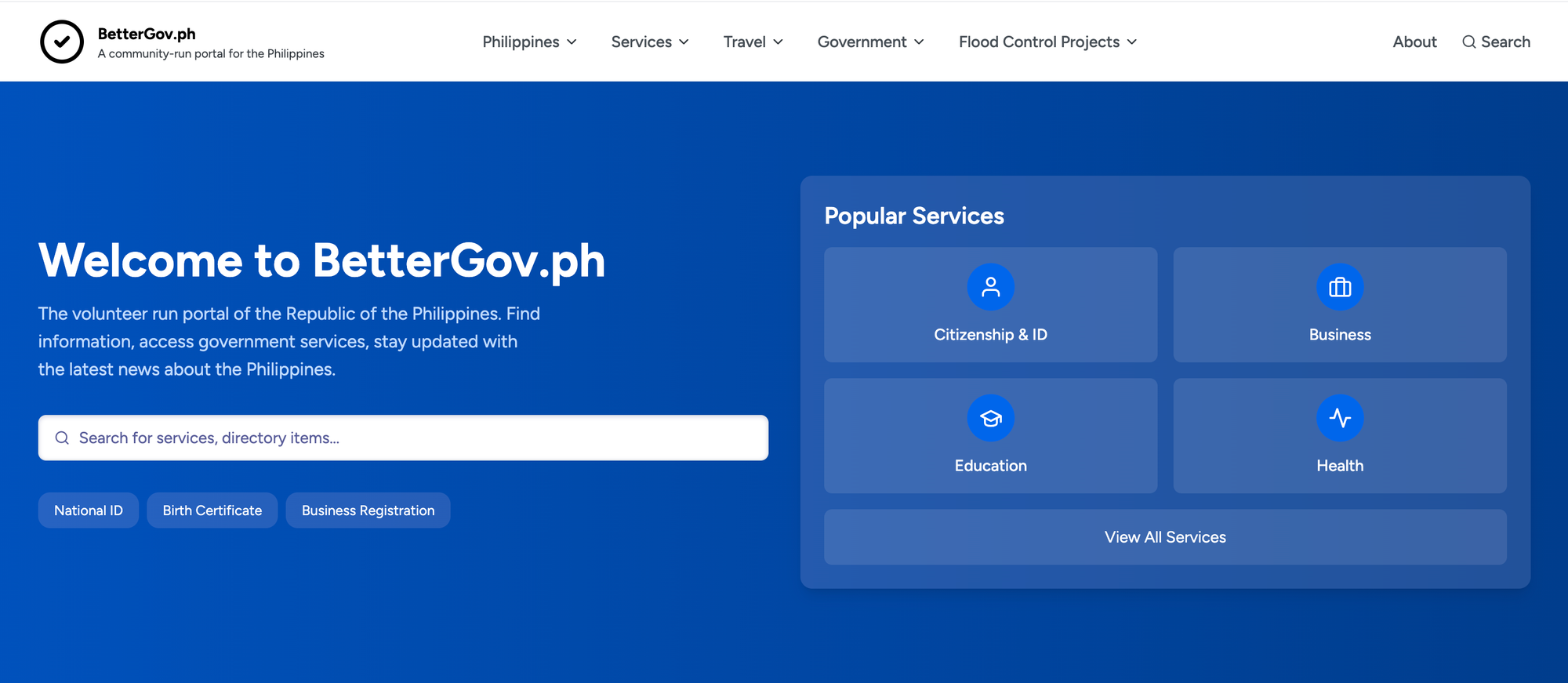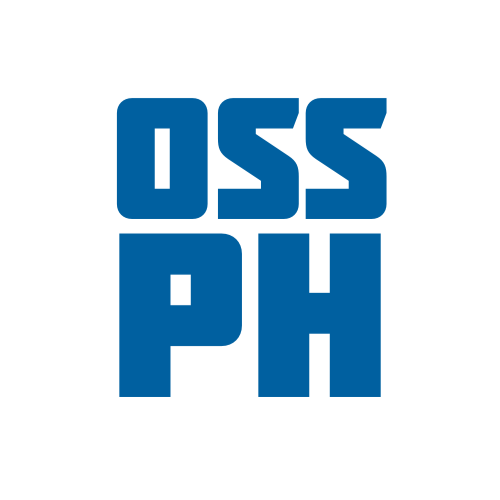BetterGov.ph: How ₱3,000 and civic anger sparked a movement for transparency
In September 2025, Filipino developer Jason Torres did what many frustrated citizens only dream about – he built a better government website.

In September 2025, Filipino developer Jason Torres did what many frustrated citizens only dream about – he built a better government website. For just ₱3,000, Torres and a small team of volunteers created BetterGov.ph, a community-powered portal that's rapidly evolving from a simple website into a movement for transparency and accountability in Philippine governance. What started with four volunteers has grown to over 75, demonstrating that Filipino developers are ready to code their way to better governance.
The Philippines currently ranks 114th out of 180 countries in Transparency International's Corruption Perceptions Index with a score of 33, well below the global average of 43. Despite government initiatives like the eFOI portal and PhilGEPS, many citizens still struggle to access government services and information through outdated and confusing official websites. This is where BetterGov.ph steps in – not to replace government systems, but to make them more accessible to ordinary Filipinos. The platform represents a new wave of civic technology that complements official transparency efforts while maintaining the independence and agility that only grassroots initiatives can provide.
From frustration to action in 48 hours
Torres, a member of the Startup PH community now based in the UK, launched BetterGov.ph after looking at existing government websites with dismay. "If you look at the gov.ph, the Senate, and Congress websites, they all look outdated and embarrassing. Lack of love," he observed. His response was swift and pragmatic: build something better without asking permission.
The platform organizes government services into intuitive categories – housing, social services, business registration, and trade – making it easier for citizens to find what they need. It provides comprehensive directories of local government units across all Philippine regions, from Central Luzon to Eastern Visayas, complete with official names and positions. But BetterGov.ph isn't just about better navigation; it's about reimagining how citizens interact with government. The platform has become an incubator for civic tech ideas, with community members proposing features like a "rate politicians" system and a "Glassdoor for government agencies" where citizens can anonymously review their experiences with different departments.
A platform built on open source values and volunteer power
What makes BetterGov.ph particularly relevant to the open source community is its development philosophy. Built entirely by volunteers using freely available tools, the platform demonstrates the power of collaborative, transparent development in addressing public challenges. Torres has committed to sharing API endpoints, providing server infrastructure, and offering AI credits to other civic tech builders, embodying the open source ethos of sharing resources for collective benefit.
The technical support ecosystem Torres is building extends beyond just code. He's organizing hackathons, providing mentorship from industry veterans, and helping civic-minded developers find teams for their projects. This approach transforms individual frustration into collective action, creating a sustainable model for civic innovation. The movement has already attracted volunteers from both government and private sectors, united by a shared vision of using technology to improve governance.
Complementing, not competing with government efforts
BetterGov.ph operates in a complex ecosystem of governance reform initiatives. The Philippine government has invested heavily in digital transformation, with a ₱88.5 billion ICT budget for 2025 and platforms like the eGovPH Super App serving 7.2 million users. The enhanced PhilGEPS system has reduced procurement time from three months to two, while the eFOI portal has processed over 250,000 information requests since 2016.
Rather than duplicating these efforts, BetterGov.ph fills critical gaps in accessibility and user experience. While government platforms focus on compliance and official processes, BetterGov.ph prioritizes citizen needs and intuitive design. This complementary approach reflects a broader trend in Philippine civic tech, where community-driven projects like Project AEDES (a dengue prediction system that won a NASA award) and Development Live (a citizen feedback platform) work alongside government initiatives. The platform represents the latest evolution in a four-decade tradition of Filipino civil society innovation, from the post-EDSA reform movements to today's digital activism.
Building a movement for transparency through code
The impact of BetterGov.ph extends far beyond its website. In just weeks, the volunteer base has grown by 1,875%, from 4 to over 75 contributors, signaling strong grassroots momentum. The platform has sparked conversations about what government services should look like in the digital age and demonstrated that citizens don't need to wait for official reforms to improve their interactions with government.
Community members are actively developing ambitious features, including blockchain-based project monitoring for complete transparency and better data visualization tools for government statistics across industries. These innovations aren't just technical exercises – they're practical responses to real problems Filipino citizens face daily when trying to access government services or hold officials accountable. The "we don't need permission" philosophy driving BetterGov.ph resonates with a generation of Filipino developers who see code as a tool for social change.
Why this matters for the open source community
BetterGov.ph embodies the transformative potential of open source principles applied to governance challenges. By building transparently, sharing resources freely, and welcoming community contributions, the platform demonstrates how open source values can drive democratic participation and government accountability. For OSSPH and the broader Filipino tech community, BetterGov.ph represents an opportunity to be part of a movement that uses our technical skills for national development.
The platform's success challenges the notion that meaningful governance reform requires massive budgets or government endorsement. At ₱3,000, BetterGov.ph costs less than a smartphone but has the potential to improve how millions of Filipinos interact with their government. This efficiency ratio – minimal cost for maximum social impact – exemplifies what's possible when the open source community turns its attention to civic challenges.
Torres's commitment to supporting other civic tech initiatives with infrastructure, tools, and mentorship creates a multiplier effect. Every developer who contributes to BetterGov.ph or launches their own civic tech project strengthens the ecosystem of transparency and accountability tools available to Filipino citizens. This collaborative approach transforms individual technical skills into collective civic power.
Joining the movement for better governance
As members of the open source community, we have unique capabilities to contribute to governance reform. Whether through contributing code, sharing expertise, or building complementary tools, every action strengthens the foundation for a more transparent and accountable Philippines. BetterGov.ph shows that we don't need to wait for perfect solutions or official approval – we can start building better governance tools today.
The platform's rapid growth from a "silly idea" to a 75-strong volunteer movement proves that Filipino developers are ready to channel their frustration into constructive action. As Torres puts it, "I'm angry, you're angry, but we can contribute in our own ways, no matter how little it is. We can do amazing things together." For those interested in joining this movement, BetterGov.ph welcomes contributors through their website and community channels, offering opportunities to work on everything from improving user interfaces to developing blockchain transparency tools.
OSSPH stands with initiatives like BetterGov.ph that use open source principles to promote transparency, accountability, and citizen empowerment. Together, we're not just writing code – we're coding a better future for the Philippines, one commit at a time.
About the author
Joff Tiquez, hailing from Manila, Philippines, is the individual behind the establishment of OSSPH. He is a web developer who strongly supports open source and has been overseeing projects like Vue Stripe for an extended period. To get in touch with Joff, you can visit https://jofftiquez.dev

